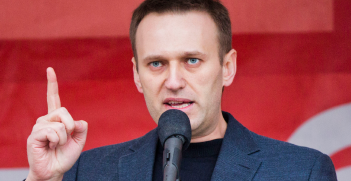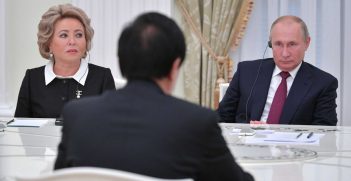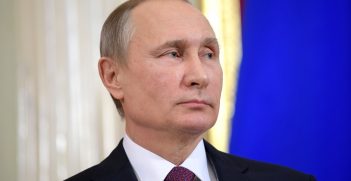An Update on the Status of War
Now is the time for those who like to play war games or develop notional military strategies. There have seldom been so many rich pickings from which to choose.
In the past week, depending on where you are or what you watch, you could be led to believe that China may soon invade Taiwan, Russia could grab another slice of Ukraine, the “Troubles” may return in Northern Ireland, or hard-won women’s rights to education and other freedoms in Afghanistan will be sacrificed to the Taleban. Deep failures in international cooperation have also been apparent: vaccine wars over COVID-19 and widely reported conflicts on climate change.
And all this without the real wars actively being fought: the bloody conflict in Yemen where Saudi Arabia bombs civilians; the atrocities and genocide in Myanmar; the widespread raping of women by Ethiopian soldiers in the Tigray region; and other events that have caused a surge of refugees heading for shelter in Europe.
As a geopolitical analyst and journalist, not a fortune teller, I am prepared to say that China will never achieve its long-held ambition of controlling the island of Taiwan. As long as he remains in the Kremlin, Russian President Vladimir Putin is as capable of grabbing inadequately defended territory as he is of organising the poisoning of political opponents. This year, Boris Johnson’s big lie, that the agreement he signed on trade with the European Union would not lead to a customs border between Britain and Northern Ireland, has inevitably happened, betraying Unionists, fomenting violence, and threatening the Good Friday Agreement.
It is worth taking a closer look at the most serious of these threats and problems one by one. According to the Australian Financial Review, China has activated preparations for potential action in the Taiwan Strait. This follows a meeting in Washington late last week between President Joe Biden and Japanese Prime Minister Suga Yoshihide. Should Taiwan be attacked, both Japan and Australia are unlikely to be called to support any military action taken by the United States.
However, it is hard to see how Beijing could benefit from mounting an attack on Taiwan now. With the United States Pacific fleet and the navies of US allies in the region on high alert, there would be no element of surprise. The shortest sea route between the Chinese mainland and the Taiwanese west coast is about 160 kilometers, a crossing that would take a well-drilled flotilla at least five hours to make. It would be a journey from hell. The Chinese maritime force would be subject to a terrible battering from the nuclear submarines patrolling deep in the China Sea, as well as air and missile attacks by US and allied forces. The surviving invaders would be in no position to counter the reception committee that would await them. In the unlikely event a landing were achieved, the Royal Australian Navy and the US Navy, operating from Western Australia, would prevent tankers carrying crude oil from the Persian Gulf from passing through the narrow straits between the Indian Ocean and the South China Sea.
But all this is academic. This week, the world’s two largest economies and greenhouse gas emitters, China and the United States, committed to work together to speed up the climate change battle, ahead of the G7 summit in June and the United Nations COP summit in Glasgow in November. In a major speech this week, China’s president Xi Jinping reiterated his call for a new world order based on multilateralism, adding “bossing around and interfering in other countries’ internal affairs will not be well received.” In other words, a dig at America, but the idea among some Australians of an imminent war over Taiwan is greatly exaggerated.
The Russian threat to Ukraine is a different order of magnitude. This week, Ukraine said that there were now more than 120,000 heavily armed Russian troops along its eastern border. Its own forces, backed by NATO, are on alert in anticipation of an invasion. Two factors led analysts to take this threat seriously. First, Russia’s president, Vladimir Putin, is unpredictable and lacks the measured style of China’s Xi. More important, Putin and his Russian generals have form: drones have been spotted dropping arms to the Russian separatist enclave beyond the border, and a large flotilla of Russian amphibious assault ships are based in the Sea of Azov not far from the port of Mariupol, Ukraine’s tenth largest city.
Still, when in 2014 Putin used force to grab back Crimea, a former part of the Soviet Union, it was unheralded, and it seems unlikely the Russian leader would so blatantly anticipate an attempt to regain a significant slice of the former Soviet empire. Putin craves attention, remains bitter at being kicked out of the G-8, and is probably more anxious than Joe Biden to have the one-to-one summit that is on the cards. On Wednesday, Putin delivered his annual state of the nation speech, promising Russians better times ahead and more government support for those facing economic hardships. But he saved his most fiery remarks for the end with a message for the international community: Anyone who threatens Russia will regret it like they’ve never regretted anything before. The problem for Russians is that a war with NATO across the North European plain can only bring harm to Russia.
The most worrying “war” is the ongoing struggle against the coronavirus. Despite widespread vaccination programmes in some countries, infections are rising globally, especially the new variants from India, Brazil, and South Africa. Vaccine wars have intensified, while coordinated preventative actions have weakened. The opening up of international travel is slow. It is hard to be optimistic.
Colin Chapman is a writer, broadcaster, and public speaker, who specialises in geopolitics, international economics, and global media issues. He is a former president of AIIA NSW and was appointed a fellow of the AIIA in 2017.
This article is published under a Creative Commons License and may be republished with attribution.





